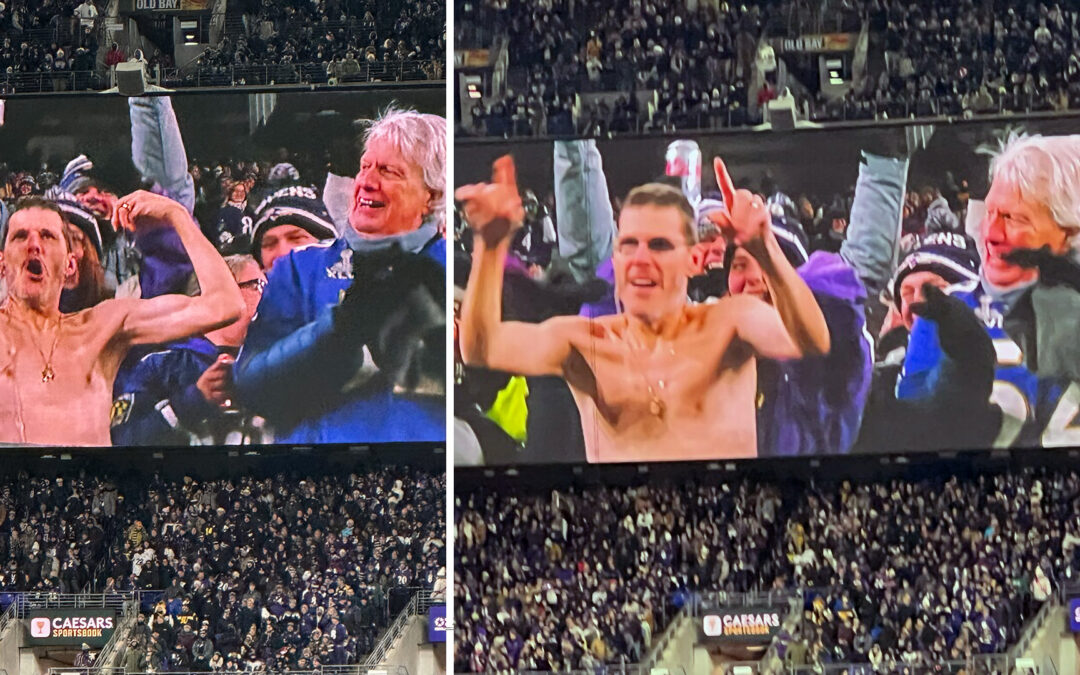
by Robert Bowie, Jr. | Jan 15, 2025 | Featured, Humor, Personal
At 8:30 pm, kickoff time last Saturday night, it was four degrees below freezing but that didn’t bother me because I am still a young man and invincible. The truth is I was probably the oldest geezer at this playoff game at Ravens Stadium that night.
The only concern I had was how many layers I needed. I figured about three or four layers would keep me warm. I put on hiking boots, double socks, old long johns, regular zip-up khaki pants, zip-up snow pants with a snap at the top to hold it all together and then, above the waist, two parkas layered on top of each other, and my Ravens’ Ray Lewis jersey, then finished off with thick gloves and a hat that I could pull down over my ears. I probably looked like a Michelin Man moments before a career ending explosion.
As I dressed for the game, it never occurred to me that this might be absolutely the coldest I wiould ever be in my whole life.
Susan and I have compiled six season tickets on the rail at the corner of the end zone. These tickets are great because they are so close to the field it is like watching high school football.
I bought the tickets over 20 years ago when my son, age 12 and under five feet tall, announced he wanted to be a quarterback and begged me to get us Ravens tickets, which I did.
Of course, as soon as I had purchased the tickets, my son asked my assurance that if, per chance, the Ravens went to the Super Bowl we would also go to the Super Bowl, to which I agreed.
Even the Las Vegas odds makers were good with that bet. Much to my horror, that year we went to the Super Bowl and I found myself behind a 711 in a dark parking lot peeling off $100 bills to get tickets to Tampa Bay where the Ravens would beat the New York Giants.
Nonetheless, in the first game of that very first season, way before that Super Bowl, we met lifelong friends who would occupy the seats behind us. The father sat right behind me on the aisle and, next to him, right behind my son, was his son Derek, who was several years older than my son. Derek listened to the game with a headset while we all watched live. The first play there was a whistle blown, and all the people behind us burst into rowdy inquiries about what the hell was that whistle for.
My son, already a scholar of the game, immediately turned around and answered: “The quarterback took a step before the snap.” Instantly, the stadium announcer repeated the exact same words my son had said, as did the announcer on the radio, which Derek then quoted. From the beginning, Derek, his father, his family, and Rick and I became friends and have remained friends ever since. Derek, from the start, was a fact checker and reserved, thoughtful observer.
During the regular season, we give the tickets to our children and watch the games on TV. However, if the Ravens got into the playoffs, you gotta go!
So that’s how I got to see Derek again for the first time this year at Saturday’s playoff game. Everybody was bundled up, but the hugs and the high fives were everywhere as the stadium filled and became more and more raucous.
Despite my layering, I started to get cold as soon as I got out of the car. We had about an eight-minute walk to the stadium. I proved to myself what I had often heard, that you lose 30 percent of your heat from the top of your head, so I pulled the hat down over my ears as I plodded toward the stadium.
I was shaking with cold by the time we reached our seats. I wanted to take pictures with my phone but I had to take off my gloves first. I had no place to put my gloves so, finally, I tucked them into my hat and put my hat back on. Then I started to shake and the hand warmers fell with my gloves, onto the field. After my gloves were returned to me, my hat fell off onto the field, and that had to be returned to me as well.
By halftime, my feet were freezing and I had to go to the bathroom to try to warm up. There was a line in front of the stall where I had hoped to strip off each one of my three layers in order to be able to stand and deliver in front of the toilet with privacy. But because the line was too long, I had to strip down in front of one of the many urinals, and so a crowd watched me slowly disrobe as I tried to unzip three sets of zippers and drop my pants. That took some time, but it got much worse when I tried to pull the three layers back up, because the long johns’ old elastic waist belt had deteriorated and broke so I developed “droopy drawers.”
In order to re-dress myself, I had to move out of the way of others who wanted to use the urinal, so I stood in the middle of the floor with a bank of urinals on either side of me as football fans with beer-loaded bladders filed in, looking at me as I tried to zip up and button up and pull up my pants as they passed. The button snap at the top of the snow pants was an Olympic event.
By the time I reached my seats again, the roar in the stadium had continued to rise so nothing could be heard except the screaming of the crowd. Derek was screaming at the top of his lungs and had moved from his aisle seat down to stand next to me at the rail. The place was insane.
At the other end of the stadium, in the second balcony, a man started ripping off his shirt and started spelling out R-A-V-E-N-S, bare chested, and the stadium burst into cheers and chanted the letters. Then, of course, his entire performance was being performed on the Jumbotrons at both ends of the stadium.
At this point, I was convinced if I thought about how cold I was, I would give my brain frostbite.
I clenched my whole body to try and keep warm. Then there was an explosion of noise all around me. Why was everybody shouting around me and pointing at Derek?
Derek, who had always been reserved, was upstaging the guy at the other end of the stadium, and was now ripping off his shirt to the delight of the crowd. As I was freezing to death, Derek was getting naked on the Jumbotron.
If it takes a village to raise a child, it apparently takes a football stadium to mature a geezer.
I’m not quite as upset that the Ravens’ next game won’t be at home, and I’m certainly not going to Buffalo. If I don’t get pneumonia from the postseason, I’m planning to go to the first preseason game in late August — in shorts and a Ravens T-shirt.
Life has always been good to me as a slow learner. I finally threw away the snow pants with the broken elastic belt.
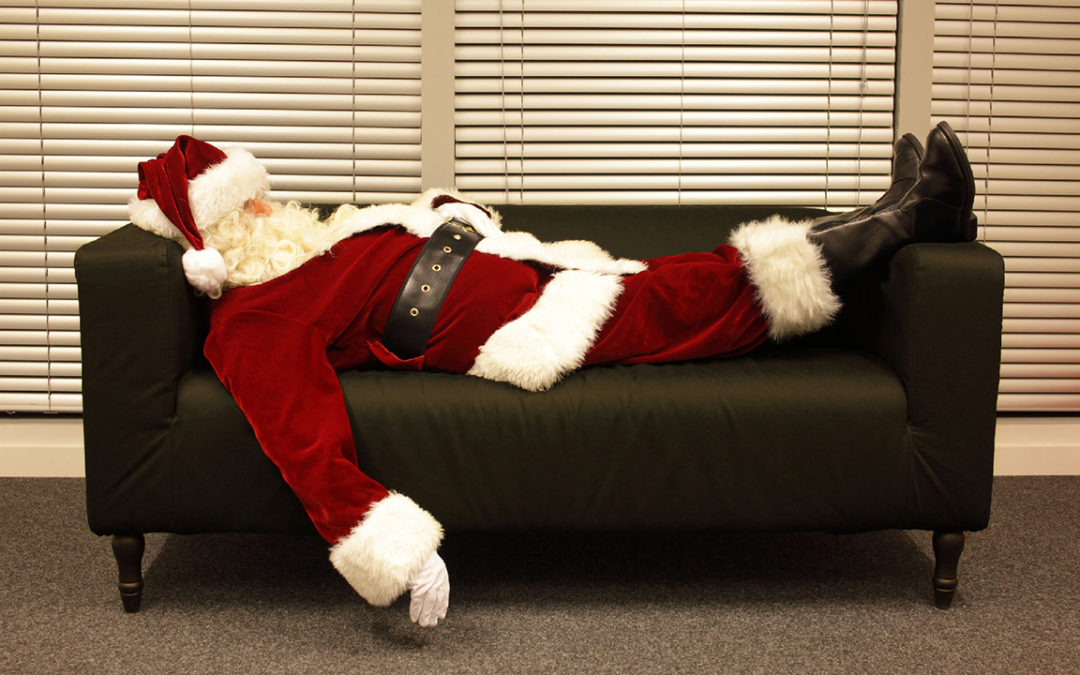
by Robert Bowie, Jr. | Dec 24, 2024 | Featured, Personal, Poetry, Shorter Stories Book
Once upon a time… I was in a Rotary Club that was going to sing Christmas carols at an old age home, but because I couldn’t sing or dance, I had to be Santa. I had to wear a huge red Santa suit, and a big grey beard that hooked behind my ears, install two king-sized pillows into my new jolly belly and then keep it all together with a big black belt to hold my pants up.
It took a long time to assemble Santa, so I dressed at home and drove in my little BMW Z3 convertible to the event. I’m a good driver, but I was listening to Jingle Bell Rock or the Chipmunks or something and I found myself as the last car in the middle of an intersection trying to turn left into an old age home as the light changed. All of a sudden, there was loud honking as traffic passed in front of me and behind me as I spread Christmas joy throughout the intersection.
It was a pretty long light, so I got a lot of attention from the Santa-stalled traffic. Everybody was honking at me and children were laughing and waving at Santa from the backseat in the slow moving cars that went past me as the traffic jam spread like a stain in all directions. When the light changed, the last car to get past me gave me a Merry Christmas two-fisted finger and stopped in front of me and leaned on the horn as we spread our joy of Christmas in all directions.
That is the exact place. The “when” and “where,” the “place and time” I lost my Christmas spirit those many years ago.
It’s not come back yet. Someday I may want to be Santa again, but not yet. I still have Santa PTSD but I’m working my way through it. I try to think about happy things as I fight to regain my real inner Santa. I imagine I am taking a warm shower:
Santa
Like a massive multicolored parachute
His boxers have collapsed upon the floor
Slightly south of a wrinkled Santa suit
That was left just outside the bathroom door.
A bunch of imagined elves in repose,
Smokin’ cigarettes, feet on the table,
Hangin’ and laughin’ ’bout Rudolf’s nose
Are lovin’ life as only elves are able.
Another Christmas is, at long last, past
As the fat man shampoos in the shower
And thinks of golf and summer thoughts at last.
Who’s this metaphor for redemptive power?
An old fat guy driving a sled with gifts?
A father at midnight is what it is.
——
If you are like me and somewhere, perhaps in some random traffic jam, you also lost your Christmas spirit, here is Santa’s two-step solution:
First, seriously get over yourself and just do something nice for someone else. I’m serious about this! It can be nothing but a random act of kindness but make it happen. You will be amazed at what will happen. It will rekindle that lost Christmas spirt. Don’t expect anything in return.
…And second, when you are asked who gave you this advice, straight out tell them, without hesitation, that you got the advice from Santa. There’s a pretty good chance you can share a free Christmas dinner in some state institution.
Merry Christmas and Happy Holidays from me to you. Peace on Earth! Make it happen with random acts of kindness while expecting nothing in return.
P.S. A little side note: If you want to make commercial Santa’s Christmas, you can buy his book, An Accidental Diary: A Sonnet a Week for a Year on Amazon. Or maybe pick up his new book, The Older You Get the Shorter Your Stories Should Be at The Ivy Bookstore in Baltimore, The Manner Mill in Monkton, Maryland, or at https://bookshop.org/shop/robertrbowiejr)
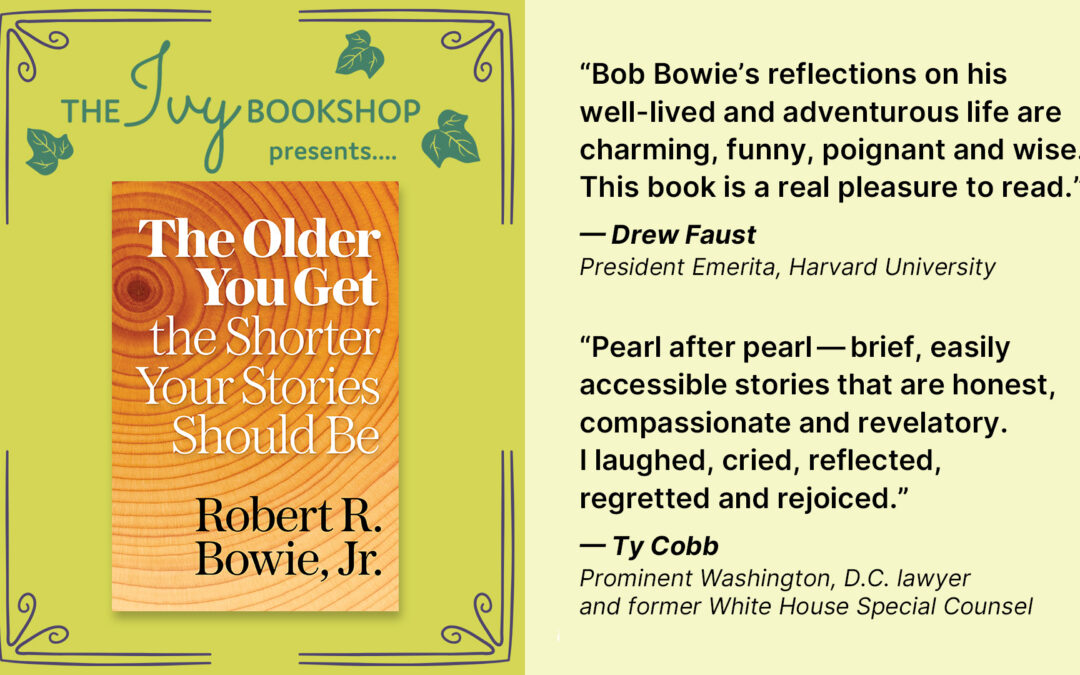
by Robert Bowie, Jr. | Dec 3, 2024 | Featured, General, Personal, Shorter Stories Book, Travel
If you’re tired of Black Friday, Small Business Saturday, Cyber Monday, and Gift Return Tuesday, I have an alternative for you that will make you laugh.
First, I bet you that you have never been as embarrassed as I have been. If you start laughing as you read this story, continue on to get a reward after you’ve finished reading.
The Story:
You think you’ve been embarrassed? Well, I’ve got you beat.
First, it all happened to me on the other side of the planet so I couldn’t go home, turn off the lights and put my head under the pillow.
It happened in Xi’an, China, in an airport the morning I was scheduled to fly to Chongqing to see a panda sanctuary, then board a boat to go down the Yangtze river through the Three Gorges, and then down to Shanghai.
Second, I was traveling with a small group and the Xi’an Airport was huge, so I had nowhere to hide as my embarrassment went on and on and on…
It all started innocently at dinner the night before we were scheduled to fly out of the Xi’an airport the next morning. Our guide addressed the group and informed us that because our plane left so early the next day we all must have our bags packed and outside of our door at 4:30 so they could be picked up and taken to the airport before we went to breakfast.
Everything had to be packed except the clothes we would be wearing the next day and whatever toiletries we required for that morning.
We were told that those toiletries, once used, had to be carried on our person until we landed at Chongqing airport several hours later at which time we could return them to our suitcases.
After dinner that night, we all went up to our rooms, picked out the essential toiletries, which in my case was toothpaste, toothbrush, shampoo, razor, soap, and hairbrush. I also chose my clothes for the next day, which in my case, were one of my endless pairs of khaki pants, a blue long sleeve business shirt, underwear, sox and shoes.
All the rest was packed in the suitcase, which I put outside the door right before I set the alarm and went to bed.
The next morning when my alarm went off, before I showered and shaved, I peeked out the door. My suitcase was gone and on its way to the airport. I looked at the clock and measured the short time I had to get to breakfast.
After my shower, I bundled up my toiletries, put on my blue business shirt and started to pull up my khaki pants, but couldn’t understand why I couldn’t get them on until I realized that the only pair of pants I had to wear were actually those I had mistakenly packed, which unfortunately belonged to my teenage son.
My son has a 32-inch waist. I do not.
I was running out of time. I had to get to breakfast.
I grabbed both sides of the pants so that my fingers gripped the pockets and I hoisted as hard as I could. No progress.
Next, I lay on my back on the bed with my feet extended in the air and bounced on the bed to get maximum leverage, kicked my feet into the air and yanked with all my strength. No progress.
The top of the pants made it to maybe slightly above my crotch. I’m pretty certain I did not get the pants high enough to halfway cover my back end. Nothing.
Next, I tried straddling a chair and forcefully rode my pants like a cowboy rides a horse in order to force the crotch into submission. I then tried jumping up and down to get maximum thrust, lift and torque. Nothing. This was not good!
I had to get to breakfast but I couldn’t leave the room. This was not good at all!
I reassessed my situation.
I still had to put on my shoes and socks. I would have to roll up the bottom of the pants so that I wouldn’t trip over them.
I was able to walk, but only if I could hold the top of my pants up as high as possible, and walk with my knees banging together every time I took a step.
I searched the room for any possible help. I was fortunate to find yesterday’s Chinese newspaper — bright with color — to cover my crotch.
It was a very long and slow elevator ride for every inch of the decent down maybe three floors. I noticed that the Chinese people in Xi’an, at least in this elevator on this particular morning, tended to be very quiet as they tried to find someplace else to look other than at my crotch.
My group at breakfast was less forgiving. They had to stop eating because they couldn’t stop laughing.
Our guide tried to be helpful and encouraged me to wander the airport to find a clothing store, apparently in the hope that I could learn Mandarin instantly and acquire a pair of pants that was twice the size that any self-respecting member of the culture would never wear.
The guide was just trying to be helpful I know, but didn’t seem to understand that I was really, at this point, no longer interested in clothing. I was no longer hoping to fit into the culture.
I was hoping to vanish from the face of the earth.
Everyone in the airport seemed to be walking by and rubbernecking in order to catch sight of whatever everyone else was laughing at.
I was completely hunched over, gripping my newspaper and pants, with my pant legs rolled up above my ankles and, just to add to my unlikely assimilation into the culture, I was wearing my disposable razor, shaving cream, toothbrush, toothpaste and hairbrush bundled up into a boutonniere blooming from my shirt pocket to add to my look.
The Chinese newspaper was fast becoming my most valuable asset since, as it turned out, my seat on the plane was between two meticulously dressed, very frightened Chinese businessmen who apparently feared any eye contact with me, their fellow traveler, for fear that it might prompt me to flash them.
In times like this I try to focus on making my situation into a positive learning experience.
After thinking about my situation for a little while, I concluded there wasn’t a lot to learn so, in the alternative, I thought it might be helpful to try to imagine what could be worse than what was happening to me at this exact moment.
I no longer wonder what it must feel like to wear a miniskirt if you are knock kneed, but that wasn’t bad enough, so I tried to imagine what it was like to wear a miniskirt, knock kneed with high heels.
I made sure that I would be the last person to leave the plane when we landed. in order to give the baggage handlers extra time so when I went to pick up my bag it would be there.
I hid in the airport men’s room for a while. I was afraid I had permanently injured my lower intestines. I was sure I had bruising. I couldn’t really lift or lower my pants now.
Eventually, I built up all my courage and raced through the teeming airport hunched over, with one hand holding the top of my pants and the other gripping my newspaper.
I swooped down on my bag and hauled it into the men’s room, found a stall, opened the suitcase, liberated myself of my son’s pants, and instantly threw them away for no good reason other than I needed to purge them.
A few months ago, I went on a trip with some of that same group that had gone on the China trip. When my story came up, I refused to relive the experience, so they went right ahead and told it anyway. They kept on embellishing the story at my expense.
The trip to China was 10 years ago, and the listeners could not stop laughing. Apparently, it gets better and better.
One person, who I am not sure was even on the China trip, claimed to have seen it all from the back and referred to it as “the morning the moon rose over the Yangtze!”
I must now live in infamy forever.
—
The Reward:
Good for you! You laughed. You are honest because here you are and so you deserve a reward. Now that you’ve laughed you don’t feel quite as bad about not completing your holiday shopping on Black Friday do you?
So here is your reward.
You will be pleased to learn all your remaining shopping can be completed for everybody left on your list, including stocking stuffers!
That story, which you just read, about my “streaking” through China is the very first story in my book, The Older You Get the Shorter Your Stories Should Be, which is now available at The Ivy Bookshop, The Manor Mill, Porter Square Books, or you can order from Bookshop.org (https://bookshop.org/shop/robertrbowiejr) or Amazon.com, where there’s even a Kindle version now! Or you can ask your any book store worldwide to order it using the following ISBN: 978-1628064209.
In addition, this book is perfect for regifting. Buy a copy for yourself. Tell your second recipient that you’ve road tested it because you care so much for them.
Finally, all the stories are short and perfect for your friends and family with short attention spans and they are great for deliberate bathroom reading and, of course, if you buy lots of copies you will make me really happy, too.
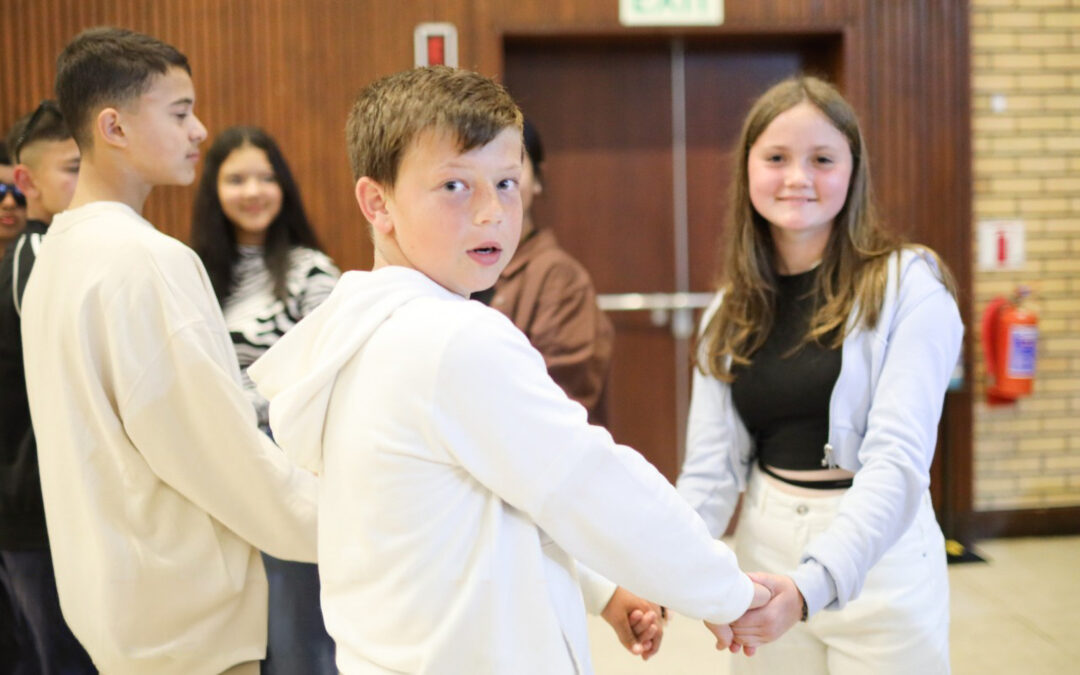
by Robert Bowie, Jr. | Nov 26, 2024 | Featured, Personal, Shorter Stories Book
Almost 35 years ago I nearly lost my name, but 60 years ago I definitely lost my innocence.
Back in the mid-1990s, I was an aspiring business litigator who liked intellectual property. The Internet had entered the world and I reserved “bowie.com” as an email. Shortly thereafter, I got a phone call from a gentleman with a thick New York accent who asked, “Are you Robert BOWee?” I said I was Robert BOOwee. That is the exact moment I lost my name. He responded “Hello Mr.BOWee, I am David BOWee’s representative (you can look me up) and David told me to tell you that “if you will give him bowie.com he will give you front row seats, backstage passes… and all the shrimp you can eat!”
I thanked him for his interest, but demurred.
Two days later, I got a second phone call from the gentleman, who again asked me if I was Robert BOWee. I corrected him and then he corrected me back and ever since then my name was forever changed to BOWee except in Maryland and Texas.
I have been a good sport about it because, for the first five years or so, I would get email directed to David that offered “the greatest sex you’ll ever have, just meet me in the basement bathroom at Penn Station.” I am such a dork that I routinely would forward these messages directly to “Davidbowie.com,” but never once got a thank you back.
That is how I almost lost my name, but this is how I definitely lost my innocence. It’s a story from my book:
For my friends and me, life was abruptly changed on the after school athletic fields in the spring of our eighth-grade year, when all of our parents signed us up for dancing school.
My friends and I were all told it was a non-negotiable part of our education.
We were divided on the subject, until one of us confessed that in church he had recently prayed to God that he be allowed to live long enough to experience sex.
We found this to be reasonably compelling and it was sufficient to open the door for the rest of us to give in and accept the inevitable.
We had been given no previous training for this.
My preparation for dancing school was to wash my hair and then soap and rinse myself several times until I was squeaky clean, then do pull ups on the shower curtain rail in front of the mirror until I began to perspire and I couldn’t do anymore, in order to improve my physique.
Dancing school started at 4:30 pm. It was held in the middle school cafeteria at our all-boys day school. After lunch, all the tables were moved to one side, the chairs were placed side by side along opposite walls, and a piano was rolled into place.
Our instructors, Mr. and Mrs. Knot, were a husband and wife team who appeared to be in their 30s. The husband played the piano, smoked constantly, and showed no enthusiasm. We all liked him from the start.
His wife however was stern, and dressed in black high heels and a low cut black dress that featured her remarkable figure. From the start we had a problem. We couldn’t look at her, but we couldn’t take our eyes off of her.
Mrs. Knot would single out the tallest boy to dance with her. She would teach him the steps while the rest of us watched. We were then lined up with the girls from tallest to shortest and we could repeat their example.
Mrs. Knot soon showed the boys how they could politely change partners on the dance floor by tapping a boy on the shoulder.
One of the shortest boys in the class, who had big glasses, tapped Mrs. Knot’s dance partner on the shoulder in what appeared to be a shameless attempt to gain favor with his teacher. She appeared to approve, until they began to dance and she realized that her high heels and his height had placed his nose in her cleavage and his glasses were focused squarely on her breasts.
The girls were at least a head taller than most of the boys and, after a week or two, Mrs Knot announced a “ladies’ choice.”
The ladies’ choice turned out to be an extremely athletic event. The girls were choosing boyfriends but we didn’t know that.
They would slowly stand and walk toward their target, but if there was competition, they would pick up the pace and start running. There were times when two competitors, in an effort to get their boy and also to stop, would pile up and slide under the chairs where we were sitting.
The situation grew more mature. Later that spring, I had a girlfriend for almost a month, but I didn’t know that until she dumped me.
This was not unusual. Attachments were formed and broken in many cases before a boy even knew he had been going steady.
I was in my second relationship and didn’t know it until I was informed that it was over. I was told by a girl who I didn’t know that I had just broken up with a girl and that I was now available.
As the classes drifted into spring, the more adventurous girls would talk their parents into parties in the basement of their home.
They were all pretty much the same. They featured a record player and rotating chaperones to make sure nobody danced close during “Moon River.” The rule was stiff-arm dancing with visible open space between the dancers.
As the spring finished up, the chaperones and other parents migrated upstairs and gathered in the living room for cocktails. Occasionally, they would do sneak attacks or peek down into the basement to make sure the lights had not been dimmed or turned off and people were not dancing close to “Moon River.” They always claimed they were just making sure “the snacks had not run out.”
By summer, we had made friends with girls and even fallen in love and knew it.
Something beautiful had happened that spring. Nobody really knew what it was other than a transition, but it was beautifully woven together as a right of passage for everyone, including the parents.
The following spring, as upper-school ninth-graders, we would spill out of school at 4:30 pm and look in the windows of the cafeteria as Mrs. Knott waltzed her way through another dumbfounded eighth-grade class.
We had friends that were girls now, and we even knew enough to know we had girlfriends. I had even learned to do pull ups before the shower.
***
“Dancing School” appears on page 29 of The Older You Get the Shorter Your Stories Should Be, available online at bookshop.org (https://bookshop.org/contributors/robert-r-bowie-jr) and amazon.com (https://www.amazon.com/Older-Shorter-Your-Stories-Should/dp/162806420X/).
This is about self promotion before and after. Please consider buying this book and giving it as a holiday present. It would make someone very happy and also that would include me, so you get two for one!
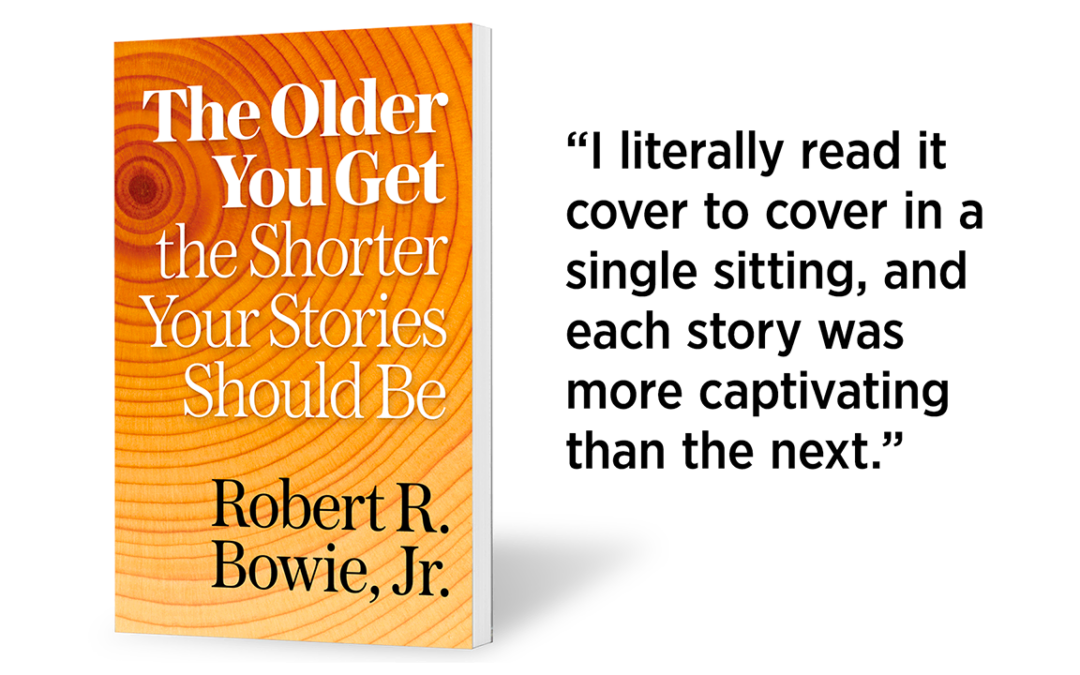
by Robert Bowie, Jr. | Oct 15, 2024 | Featured, Personal, Shorter Stories Book
Modesty prevents me from saying anything too nice about my new book, The Older You Get the Shorter Your Stories Should Be (though I am very proud of it). Fortunately, I was able to persuade several prominent folks to read it and offer nice blurbs ahead of publication, for which I am endlessly grateful.
Now, I’ve just received my first unsolicited review and I couldn’t be more elated. This really made my week!
“I wanted to write and let you know how much I loved your newest book. Starting with its clever title, this wonderful book hooked me and reeled me in immediately. I literally read it cover to cover in a single sitting, and each story was more captivating than the next. Your insight into your surgery experience was especially compelling and your Christmas story moved me to actual tears. And I had no idea what an adventure hound you are! Or that you were Mac Mathias’s driver (the last good Republican)!
“Surely more erudite readers than I will be telling you how much they love your book, but I wanted to add my voice to the chorus of your fans. I look forward to reading whatever comes next.”
— D.R.
Thanks, so much! And thanks again to everyone who came out to help launch the book and to all who’ve picked up a copy (if you’d like your own, I recommend Bookshop.org).
If you have purchased online, writing a short review would be doing me a great favor, if you’re so inclined.
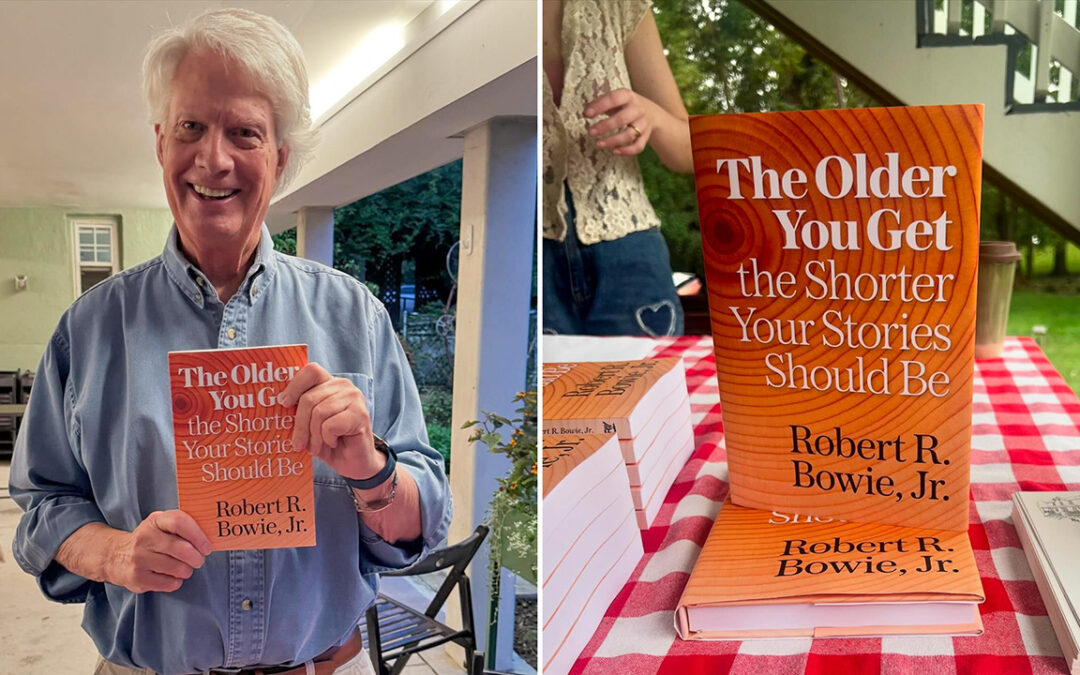
by Robert Bowie, Jr. | Oct 9, 2024 | Featured, News, Personal, Shorter Stories Book
The place was packed. The readings went very well.
Thanks so much to everyone who came out to celebrate the launch of my new book, and to all who helped make the events such a rousing success. Special thanks to the Ivy Bookshop and Manor Mill, and the terrific readers who made me look good: Jenny Keith, Michael Fallon, Mel Edden, Shirley Brewer, Dan Cuddy, and Matt Horner.
You can still get a copy of the book! Just walk into your local bookstore and give them this ISBN number, 9781628064223 — they can order you one. Or you can order it online at Bookshop.org, where you can select a local bookstore to benefit from your purchase: https://bookshop.org/contributors/robert-r-bowie-f221a7ec-5949-4493-95a2-e9264cff6049. You can also find it on Amazon.
I’m so grateful to everyone who is reading these words. Thank you for your continued encouragement and support.
…
“Pearl after pearl — brief easily accessible stories that reflect the unclouded eye of the author for all things honest, compassionate and revelatory. I laughed, cried, reflected, regretted and rejoiced reading this seemingly random collection before recognizing the common thread — clear-eyed humanity. Mr. Bowie’s curation of his self-deprecating, poignant and often hilarious moments, will become a dear friend whose warmth and comfort are there to visit again and again!”
— Ty Cobb
Prominent Washington, D.C. lawyer and former White House Special Counsel
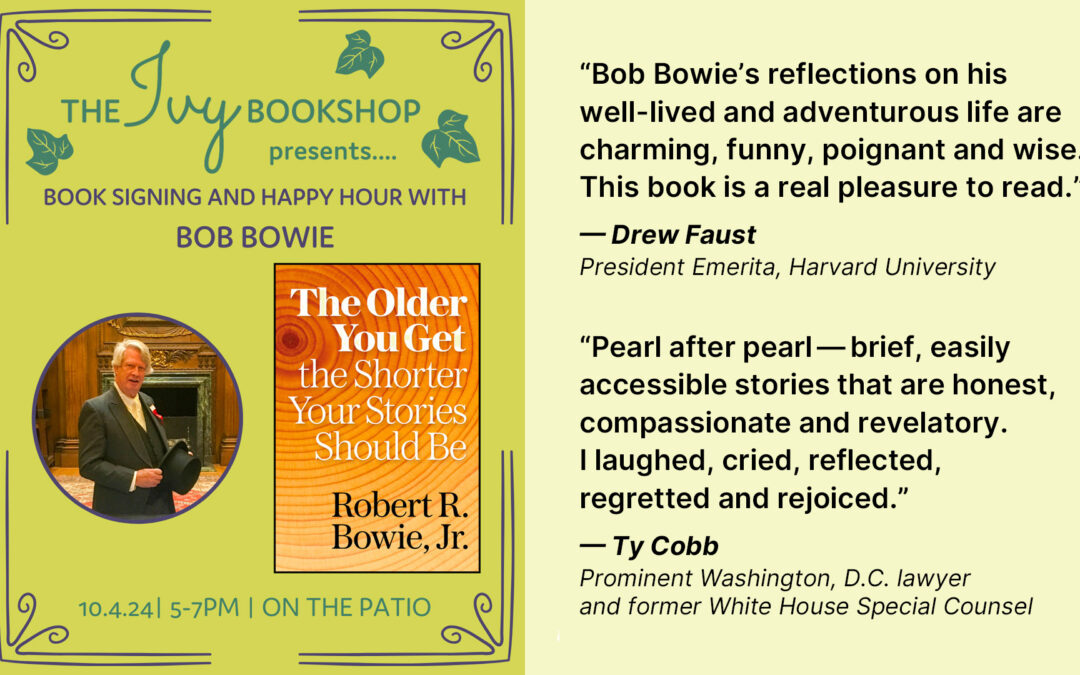
by Robert Bowie, Jr. | Oct 1, 2024 | Featured, News, Personal, Shorter Stories Book
This Friday! Please join me for a special launch celebration at The Ivy Bookshop in Baltimore, October 4th from 5:00–7:00 pm. There will be cocktails on the patio followed by a reading and book signing.
Helping me read selections from the book are the following distinguished Maryland poets: Jenny Keith, Michael Fallon, Mel Edden, Shirley Brewer, Dan Cuddy, and Matt Horner.
The Ivy Bookshop is at 5928 Falls Rd, Baltimore, MD 21209.
We’ll also be gathering on Sunday, October 6th from 4:00–5:30 pm at the Manor Mill, 2029 Monkton Rd, Monkton, MD 21111 with the same amazing lineup of terrific readers.
I hope you can make it. I look forward to seeing everyone there and signing any books that you purchased.
(If you can’t make it, the book is also available online at Amazon and bookshop.org.)
…
“Bob Bowie’s reflections on his well-lived and adventurous life are charming, funny, poignant and wise. This book is a real pleasure to read.”
— Drew Faust
President Emerita, Harvard University
“Bob Bowie has written a riveting and rollicking collection of tales comprising his life as a Renaissance Man who overcame serious childhood learning disabilities to become a Harvard Poet Laureate, adventurer, lawyer and playwright. Writing with brutal candor and self-deprecating wit, Bowie unspools stories that both entertain and pack plenty of wisdom. I thoroughly enjoyed this book.”
— Ben Bradlee, Jr.
Pulitzer Prize-winning Editor of The Boston Globe Spotlight Team
“Pearl after pearl — brief easily accessible stories that reflect the unclouded eye of the author for all things honest, compassionate and revelatory. I laughed, cried, reflected, regretted and rejoiced reading this seemingly random collection before recognizing the common thread — clear eyed humanity. Mr. Bowie’s curation of his self deprecating, poignant and often hilarious moments, will become a dear friend whose warmth and comfort are there to visit again and again!”
— Ty Cobb
Prominent Washington, D.C. lawyer and former White House Special Counsel

by Robert Bowie, Jr. | Sep 25, 2024 | Featured, News, Personal, Shorter Stories Book
As of yesterday, The Older You Get The Shorter Your Stories Should Be is now in print. What a great present for my birthday!
Please join me if you can for a special launch celebration at The Ivy Bookshop in Baltimore on Friday, October 4th from 5:00–7:00 pm. There will be cocktails on the patio followed by a reading and book signing. Books will be available for purchase there (and I’d love to have you help support the Ivy).
The Ivy Bookshop is at 5928 Falls Rd, Baltimore, MD 21209.
We’ll also be gathering on Sunday, October 6th from 4:00–5:30 pm at the Manor Mill, 2029 Monkton Rd, Monkton, MD 21111,
You can find the book for sale on Amazon and at Bookshop.org, where you can select a local bookstore to benefit from your purchase: https://bookshop.org/contributors/robert-r-bowie-f221a7ec-5949-4493-95a2-e9264cff6049
(You should also be able to ask your local bookstore to order you a copy by providing this ISBN number: 9781628064223.)
I’m so proud of this book and can’t wait for everyone to enjoy it.
…
“Bob Bowie’s reflections on his well-lived and adventurous life are charming, funny, poignant and wise. This book is a real pleasure to read.”
— Drew Faust
President Emerita, Harvard University
“Bob Bowie has written a riveting and rollicking collection of tales comprising his life as a Renaissance Man who overcame serious childhood learning disabilities to become a Harvard Poet Laureate, adventurer, lawyer and playwright. Writing with brutal candor and self-deprecating wit, Bowie unspools stories that both entertain and pack plenty of wisdom. I thoroughly enjoyed this book.”
— Ben Bradlee, Jr.
Pulitzer Prize-winning Editor of The Boston Globe Spotlight Team
“Pearl after pearl — brief easily accessible stories that reflect the unclouded eye of the author for all things honest, compassionate and revelatory. I laughed, cried, reflected, regretted and rejoiced reading this seemingly random collection before recognizing the common thread — clear eyed humanity. Mr. Bowie’s curation of his self deprecating, poignant and often hilarious moments, will become a dear friend whose warmth and comfort are there to visit again and again!”
— Ty Cobb
Prominent Washington, D.C. lawyer and former White House Special Counsel

by Robert Bowie, Jr. | Jun 18, 2024 | Featured, Humor, Law, People, Personal
As I have said before, I loved representing entrepreneurial business clients because they are crazy.
The little cases are always the funniest and the easiest to tell.
He was a general contractor who built big shopping malls and was always very gruff, extremely overweight and endlessly funny. He, his wife and I, became friends over time and my professional responsibilities merged into our friendship as we got to know each other.
After making a lot of money building shopping centers and stocking them with commercial tenants, he decided to design and build his own mansion. He bought two adjoining lots in a suburban cul-de-sac, and designed what his wife described as “a Las Vegas hotel — not only embarrassing but gauche.”
In his mansion, he determined that he wanted a large indoor fountain, as well as special toilets for his and his wife’s bathrooms. These toilets would protrude from the wall, but have no base onto the floor because he thought that was classier.
He had absolutely no sense of taste.
He battled with the architect who said that these toilets could not withstand his weight and were not classy just because they came out of a wall and didn’t have a base.
She succeeded in vetoing the lavish indoor fountain, but he won the battle in their matching bathrooms with the “extended toilet” from the wall, which had no connection to the floor.
I was his lawyer but we made each other laugh. As I was thinking back on him, I remembered defending him in a lawsuit many years before he built the mansion. He had put a roof on a tenant’s building and the tenant had decided to represent himself because he thought he knew everything about construction and could litigate better than any lawyer.
It was a little non-jury case to be tried in a packed courtroom full of lawyers and clients waiting for their cases to be called. Trying a case in a court at this level is like litigating in a circus tent a head on collision between clown cars — particularly if a defendant or plaintiff comes to represent themselves. The judges at this level have a rotating docket consisting each day of either misdemeanor, criminal, petty civil or traffic court.
I knew the judge socially. He had developed a sense of humor after too many years presiding over these petty cases and traffic court.
The plaintiff in this case argued that the “neoprene” roofing materials had been inadequate, and he was going to be his own expert witness to prove it. The plaintiff was a buffoon who didn’t know what he was talking about. It was a little case that would cost more to try than settle. The client decided to try it “on principle,” which is always a problem. He told me, “I don’t care if you win or lose, just make me laugh.”
I decided to go for broke. After the plaintiff announced that he wanted to be his own expert witness, I decided I would cross examine him on his qualifications before the judge ruled on whether he could be considered as an expert witness on roofing materials.
I asked him if he knew of the latest advancements in “neoprene” roofing materials. He clearly was uncertain but proclaimed he did. I had him hooked. I carefully asked him if he had ever heard of the new “Neofeces” roofing materials.
He said that he had. I spelled it out for him so he could be certain. He cautiously said he was certain.
So now I was crossing him on Neo (new) feces (shit) roofing materials. Clearly you could feel the courtroom saw entertainment in its future.
I asked him if it bothered him professionally that “neo-feces“ was still regrettably not yet odor free. He claimed it did not. I asked him whether he agreed that double-ply toilet paper was considered sufficient for the removal of “neo-feces.” The courtroom rustled as those watching started to follow the tightening of the noose.
After one or two more questions inquiring about the benefits of “neo-Feces,” I paused between the two words and the courtroom started to laugh a little but the witness did not. At this point, the judge stopped me to preserve order in the courtroom and instructed me that I had made my point and had “won the pot with a royal flush.” This was appreciated by all those still waiting to try their cases, as well as the backbench court watchers.
About a month after my client had moved into their new opulent mansion, I got a call from my client’s wife at around 11 o’clock on a weekend night.
She started the conversation by saying that I must come over immediately because she could no longer talk to her husband, who was presently lying on his back on his bathroom floor laughing hysterically.
Apparently, after a night of much beer and football on the super wide screen, he had sat down on his toilet and it had broken off, and he kept slipping and could not stand up because there was water shooting all over the bathroom. I told her I would contact a plumber to turn off the water and then I would be right over.
I asked her, “How bad was it?” She paused on the phone for one second and then just said, “Let’s put it this way, the goddamn toilets he wanted didn’t work, but that’s okay cause he got his goddamn fountain!”
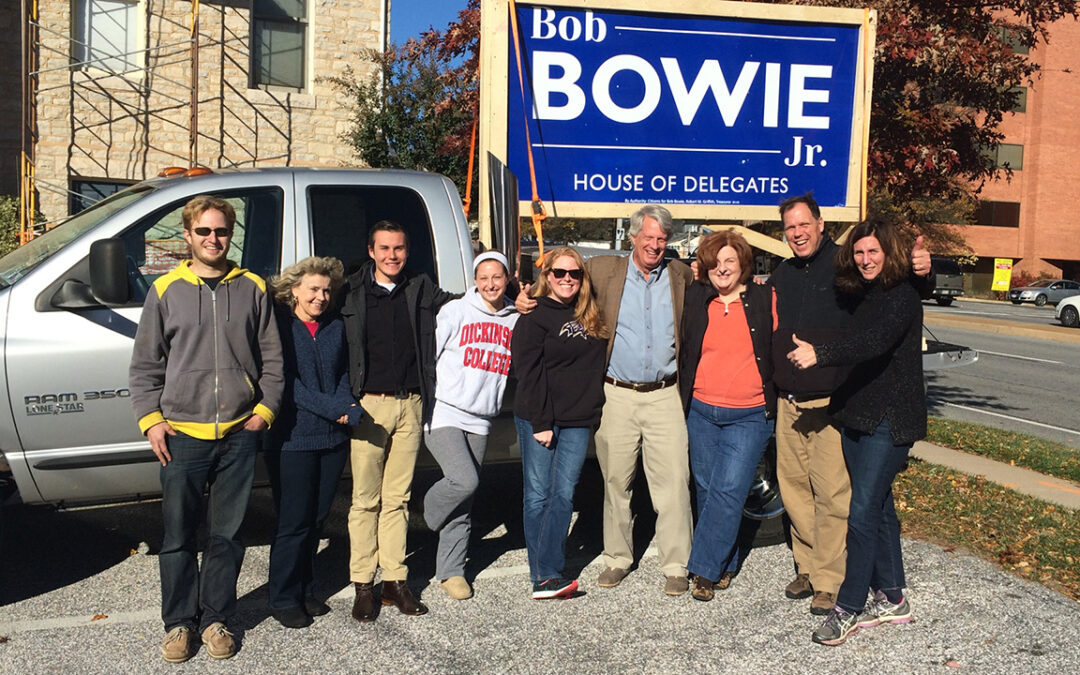
by Robert Bowie, Jr. | Jun 11, 2024 | Featured, Humor, Personal, Politics
Have you ever just stopped in the street and said to yourself, ”Wow, I wish I had that to do over!” and then found yourself exploring even larger questions?
Because of my short-lived political background, I ponder irrelevant questions and worry about them all the time.
I have some regrets.
For me it all happened back in 2014, but it only became clear what my concern should have been about two weeks ago.
Back in 2014, I was asked a question that I couldn’t answer. That was the problem.
Back then, I hated gerrymandering and concluded that the country was getting dangerously divided because of it, so I ran for political office on a theme that ”We must not lose our common ground.”
My strategy would be to find common ground with every person in my divided district and thus bring them together so we could reason together.
Maryland is two-to-one Democrat and the state legislature had crammed as many Republicans as possible into the district where I lived. I am a Democrat but I was sympathetic to my outnumbered Republican neighbors. I consulted the experts and was informed that I had at best of five percent chance of winning as a Democrat in this district.
I jumped right in!
I really believed I would win if I could find some common ground each time I knocked on another door.
I was all in. I contributed my own money to the campaign and I raised over $150,000. Susan and I and a small group of overoptimistic diehards spent that summer and fall knocking on 5000 doors, and debated the three incumbents who raised only around $5,000 together. They did not need the money. They had all been in office for over a decade in this gerrymandered district.
Late one hot summer Sunday morning, it turned out I didn’t know “ common ground” as well as I thought I did. Only about two weeks ago, did it all became clear.
When I knocked on the doors, I always had the same pitch: ”I believe we must find our common ground so we can all talk together.” Then for humor I would add, because I was over 65 years old, that ”if they were worried about term limits, nature would take care of that in my case.” Everybody laughed, and we talked as friends until I was asked whether I was a Republican or a Democrat, at which point the door was slammed in my face.
Of course, I remained optimistic. As I would drive home while the sun was going down, I believed the depth of my commitment would pull me through.
The depth of my commitment was only challenged once, when I could not find “common ground.“
Late in the August heat, I knocked on the door of a well-kept home in a trailer park, which had three steps on either side of the front door.
I knocked on that door and a heavyset woman dresses in a giant muumuu answer the door and after my pitch she announced: “I can’t talk to you right now because I don’t have any underwear on.”
How was I to answer that? For the first time maybe ever, I was speechless.
I couldn’t say, “You don’t need to be wearing underwear to read my materials,” or, “No problem I’ll wait til you put on your underwear.” I was dumbfounded. I could find no common ground.
For almost ten years, I have pondered this interchange. I thought and rethought about my inability to find an answer. I have not hesitated to tell this story to others in the hope that they might suggest something. Then about two weeks ago, a friend of mine had an answer right off the top of his head!
He said, “You forgot your theme. Why didn’t you just say, “That’s okay, I don’t either!”










